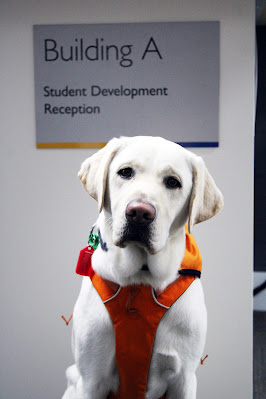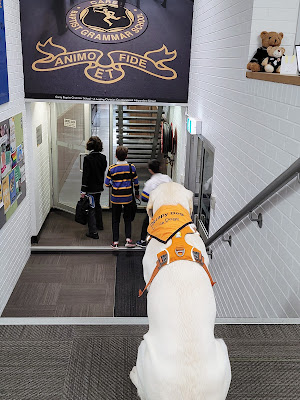Written by
Australian Dog Lover
10:22:00
-
0
Comments
As we're about to wrap up Therapy Dog Awareness Month this September, this is a chance to recognise these wonderful animals and the support they provide to individuals living with disability.
A Therapy Dog provides comfort, companionship and emotional support. Any breed can become a therapy dog if they are raised and trained effectively however there are certain breeds that tend to be more commonly seen in therapy settings like the Labradors chosen for their gentle and calm demeanour.
Therapy Dogs like those offered by Guide Dogs' Therapy Dog Programs can particularly support people who experience behavioural, emotional, developmental and mental health conditions, physical disabilities or isolation caused by age or illness.
Therapy Dogs like those offered by Guide Dogs' Therapy Dog Programs can particularly support people who experience behavioural, emotional, developmental and mental health conditions, physical disabilities or isolation caused by age or illness.
Guide Dogs Therapy Dog Specialist Elisha Lamont said “Our Therapy Dogs program is one of our lesser-known services beyond our much-loved namesake yet just as important to communities across Victoria.
“Therapy Dogs are specially trained in providing a sense of calm and comfort and just like a Guide Dogs placement, Therapy Dogs are also carefully selected to match each individual or facility role based on their personality traits.”"This September we want to raise awareness for the fantastic work of our Therapy Dogs and the important role they play in lots of people's lives, highlighting the broad range of different services our dogs can provide.”
At around 14 months of age, dogs in the Guide Dogs' Puppy Raising Program are evaluated to determine whether they will successfully complete formal Guide Dog training or go on to fulfill another role. The dogs are then assessed by trainers to determine if a Guide Dog role is best for them. If they are better suited to another career, Guide Dogs will determine what alternative roles they could fulfil in the community, such as working as a Therapy Dog.
Guide Dogs Australia currently offer two Therapy Dog Programs:
Therapy Dogs for Individuals
The primary role of a Therapy dog for an individual is to provide companionship and emotional support to individuals who might benefit.
Therapy Dogs for Facilities
The primary role of a Therapy dog for a facility is to provide companionship and emotional support on a broader scale to appropriate facilities, such as schools, nursing homes, psychologists, counsellors, and rehabilitation clinics.
The primary role of a Therapy dog for an individual is to provide companionship and emotional support to individuals who might benefit.
Therapy Dogs for Facilities
The primary role of a Therapy dog for a facility is to provide companionship and emotional support on a broader scale to appropriate facilities, such as schools, nursing homes, psychologists, counsellors, and rehabilitation clinics.
It’s difficult to know exactly how many Therapy Dogs are currently working in the community, however Guide Dogs Victoria has placed 25 dogs in the last 7 months in Therapy Dog roles. Most of the Therapy Dogs placed this year were placed with individuals, however some dogs were placed in schools and one dog was placed with a speech pathologist. Other facilities where Therapy Dogs have been placed include hospitals nursing homes, psychologists, counsellors and rehabilitation clinics to offer support on a broader scale.
Barkley’s owner and staff member at Carey Baptist Grammar School, Tanya Taylor said “Barkley has brought so much joy to Carey Baptist Grammar School’s Student Development Department since he joined earlier this year.
We’d always hoped that a Therapy Dog would add to the student experience and Barkley’s presence and loving engagement has proven as much, we are so grateful to have Barkley on our team”.
One of the aims of having a therapy dog at Student Development is to help students overcome any apprehension they may have in reaching out for Student Development support, now students come up just to say hello to him!
As students and staff arrive, Barkley’s presence provides a wonderful distraction from other pressures and promotes healthy connections between people around him. Students often chat about their own pets, or family members’ pets and have questions about Barkley.
If a student arrives distressed, Barkley will sit with the student and gladly accept the pats and tears with calm, non-judgmental ‘dogginess’.
To help train the next generation of Therapy Dogs, please visit vic.guidedogs.com.au/therapy-dogs
Guide Dogs Australia's Born to Lead TV series
September is Therapy Dog Awareness Month
We have learnt that Barkley loves to sit with people, touching them in some small way, just with a part of his body on someone’s foot.
Barkley is blissfully unaware of the broader impact he’s having in helping to destigmatise visits to Student Development, where his role is to greet everyone at the entrance, help comfort distressed students and also sometimes accompanies students into their one-on-ones.”
Guide Dogs Victoria currently have more than 30 individuals and facilities on our waitlist in different stages of the application process and are calling on everyday Australians to support its Therapy Dog Program.
To help train the next generation of Therapy Dogs, please visit vic.guidedogs.com.au/therapy-dogs
Related Topics:









